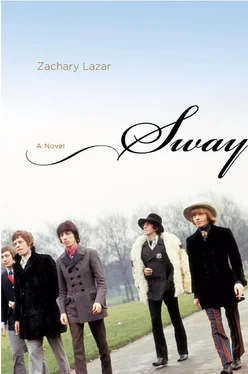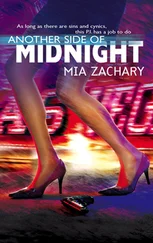She touches his hair as he’s still bent over the pram. She brushes it back behind his ear. “The bohemian look,” she says. “So unruly. But it suits you, though. Really.”
He stands straight and looks off down the row of identical stone buildings, his hands in his pockets. “We’ve been practicing,” he says. “Getting some numbers down.”
She nods her head. “I just thought you’d like to see Christopher.” She bends over the pram and nuzzles the baby, her nose and lips on his face. “London,” she says. “We’re in London.”
After a few drinks with Keith and some friends, he takes the train to Clapham to visit Tricia at her cousin Claire’s. It turns out that Claire has a husband, Neil, a tall and chinless man with a shock of black hair who works as a pharmacist. The four of them have a home-cooked dinner and Brian drinks some wine and finds himself relaxing into a magnanimous mood, riding a wave of sincerity that he begins to believe in. He holds his son high in the air and makes airplane sounds. He and Claire’s husband talk about Algeria, where there has been a revolution. As he speaks, Brian looks almost like a child. It’s clear that his enthusiasm has less to do with politics than with enthusiasm as an end in itself.
“One more loss for Europe,” he says. “But it’s all down to America and Russia now, isn’t it? Just a matter of which side they join up with.”
“Do you believe that?” says Neil.
“Believe what?”
“That it’s just a matter of which side they join up with. That the world is split in two like that. That there’s no chance for real socialism in Algeria.”
Brian smiles at Tricia, then back at Neil. “I don’t know,” he says. “What do you think?”
“Well, there’s no point in not thinking so, is there?” says Neil. “There’s no point in not being fatalistic.”
Brian pours out another glass of wine for Neil, then tilts the bottle slightly toward him as if making a toast. He pours for Claire, and then for Tricia and himself. The conversation turns to safer things — London, the cold weather, the cost of heating a flat. When they’ve finished eating, Brian and Tricia do the washing up, and they splash soapsuds on each other and sing songs the way they used to, childish songs about the people back in their hometown of Cheltenham. He is not quite insincere; in this particular moment he sees himself as fundamentally playful, a spreader of good cheer. But when he feigns sleepiness, it’s obviously a ruse, and Tricia does what he knows she’ll do. She lets him spend the night, leading him back into the extra bedroom with the baby.
She feeds their son with a bottle, patiently and gravely, then bounces him on her shoulder for a while, singing to him, until he burps. When he’s finished, she wipes his mouth with the large white napkin on her shoulder, then carefully lays him in his crib. For a long time, she makes faces over him, mewing and speaking baby talk, as if they are the only two in the room. Brian notices how bare it is: the half-empty bookcase with a lamp on one corner, Neil’s pharmacology diploma on the wall, the slanted cot with its creases visible through the sheets and the thin pink quilt. The neatness of the room — its air of a newly married couple just starting out — inspires in him a surprising resentment, then a desperate, half-convinced pride in the mindless shambles of the flat in Edith Grove.
“Do you think there’s a chance for real socialism in Algeria?” he says, moving toward her.
She is still doting on the baby as he runs his fingers through her tangled brown curls. “I don’t know what he was on about,” she says. “They wouldn’t let him in at Oxford. He’s never gotten over it.”
“I bet he has a stash of pinups in here somewhere. A leather mask.”
“What?”
“You know, he serves Claire a dinner in the nude, wearing just a mask. Eats his own meal from a dog dish.”
She pushes his hand away with a distant, skeptical smile. “I thought you were sleepy.”
“I’m going to thrash you, Neil. You’ve made me very upset,” he mocks.
She doesn’t seem to be hearing him. She lies down on the cot in her bathrobe, crossing her bare feet and closing her eyes. Her arms are folded beneath her head and she smiles faintly, a girl again. He switches off the lamp and takes off his shoes. Something about her competence with the baby has made it feel as if it were nothing more than a game they had both been playing. He can’t see her exactly, can see only her blurred image in the near darkness. In the sepia light, he sees the curve of her hip, the length of her body beneath her robe.
There is that moment when they finally take off their clothes and he feels her skin against his and his vision fades out almost completely. There is only a vertiginous blur, a torrent of inexpressible messages. What binds him too closely to girls like Tricia is this deluge of feeling. He is not very careful or skillful, but almost always he is strangely sincere, moving over their bodies with an obsessive slowness that verges on the embarrassing.
In just a few hours he sees what’s really there. The baby is screaming. In the bald lamplight, Tricia stands over the crib and tries to soothe him in her arms, tired and puffy-faced, sore but also somehow alert. He can see how natural this is for her, how bound she is to their son, and he feels suddenly displaced, confused by the idea that Tricia might think that this has anything to do with him.
Onstage, they are all awkward, all except Brian. His face is almost feminine, pale and wide-lipped, but his hands are large, blocklike, and they handle the guitar like a shovel. He attacks the strings with wide up-and-down sweeps of the wrist, forms the chords with wide-stretched fingers, making his playing look more difficult than it is. He does this while standing still, not looking at the crowd, his face unaccountably stern.
They have a bass player now, and a drummer. They are basic and direct, steeped not only in blues but in jazz.
There is no stage — it is not a club, just the basement room of a pub called the Wetherby Arms, where there are thirty people or so drinking pints and smoking cigarettes, not necessarily interested in music. What they hear now comes across as deliberately abrasive. They’ve never encountered anything so unpolished, as if the whole point of the music is to be aggressively unmusical, knowingly a fraud.
Mick moves with little head-bobbing steps around his microphone stand, pigeon-toed. What he doesn’t realize is that the collar of his shirt has ridden up above his suit jacket, bringing with it the knot of his tie, which makes his neck look comically long. The noises he makes have nothing to do with singing. But his sheer persistence is a provocation because it’s clear that he isn’t joking.
They’re playing Muddy Waters. Their version is faster, less free. The two guitars veer in and out at different angles, never touching. Brian moves his shoulders in a strange, fluent way, as if the music were somehow circular and he hears its center in the space between the beats. There’s something misplaced, something feyly undergraduate, about the length of his blond hair in combination with his somber three-button dress suit. Across the stage, Keith pounds out his chords, crouched down by the drum riser, his thin frame hunched around his instrument. He had never bothered to put on his tie and now he has taken off his suit jacket as well. He has no showmanship, but he is the one who is secretly guiding them forward, the drums following the lead of his guitar.
Some of the boys in the crowd are starting to taunt them now. They can see what is starting to happen, see that these boys with their instruments have started to believe in their own act, especially the singer, Mick.
Читать дальше












